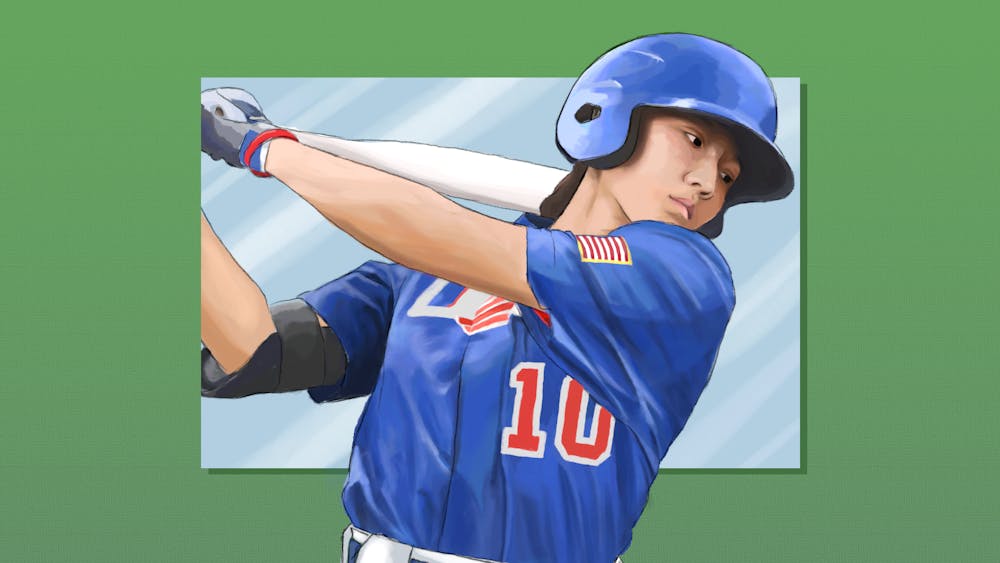This past winter, Brown’s baseball program added freshman utility player Olivia Pichardo to its roster as a walk-on. When she suits up for the Bears this season, she will become the first woman to ever play NCAA Division I baseball.
According to Baseball For All, women have played baseball collegiately alongside men since 1987, and at least nine female players are currently rostered on various university baseball teams across the U.S. and Canada. But Pichardo is the first to make it to the highest level of competition in the NCAA, and she’s doing it right here in the Ivy League. The Bears will host the Quakers for a three-game series on April 15-16.
I have long been an outspoken advocate for the growth of women’s baseball as its own distinct sport from softball. I’ve written about the history of women’s baseball, urged people to pay attention to international competitions like the Women’s Baseball World Cup, and have described my own experience playing women’s baseball on the national level back home in Canada to anyone who will listen.
I dream of a world where women have their own baseball teams in the NCAA and in the Olympics.
I truly believe we are progressing towards making that a reality — largely due to high-profile skilled female baseball players like Mo’ne Davis, Kelsie Whitmore, and now Pichardo. Women’s baseball is its own thriving community, and majority male teams should not be the only option for women who want to play baseball. But by fighting their way into spaces that so long rejected them based on their gender, these players are forcing the world to acknowledge their existence and reckon with the idea that baseball is for everyone.
Most female baseball players face an inflection point in their careers where it no longer makes sense to continue playing with men. For me, that happened when I was seventeen, after my senior year of high school. Without higher goals of college recruitment or scholarships available — not to mention the difficulties that may come with being the only female player on a team — girls who persist in baseball, even just through high school, are in the minority. The pressure to switch to softball is immense.
But Pichardo has pushed past that point. By earning a spot on Brown’s roster, she proves that there's a possibility of something more for girls who want to play baseball.
I was once one of those girls growing up on a baseball diamond surrounded by boys and men. I heard my whole life that I should be playing softball instead. Half the time, people didn’t even believe me when I told them I played baseball, just assuming because of my gender that I meant softball — at least, until I qualified it with “on a boys’ team.”
But now, every single person who reads an ESPN article or sees a viral tweet that proclaims there’s a woman playing Division I baseball … well, they might rethink that deeply-entrenched assumption.
It can be tough to be the first, to be the only. It comes with a lot of pressure, and I can only imagine the weight of Division I. I have distinct memories of watching Sarah Fuller with bated breath when she took the field as Vanderbilt’s kicker in 2020 — the first woman to play in a Power Five football game. The rest of America was watching her too.
To open the second half of that game, Fuller executed a 30-yard squib kick. Under the video of her performance posted by ESPN, the comments were a cesspool. Trolls felt the need to share their opinions: That the kick was weak, that they could do better, and that this was clearly all a publicity stunt. Never mind the fact that the kick was actually a designed play; never mind the fact that Vanderbilt’s head coach said Fuller executed their plan perfectly.
The same sort of nonsense popped up under news of Pichardo making the Brown baseball roster; commenters screeched that it’s all a PR move, or they expressed condolences to the imaginary male player whose spot Pichardo must have unfairly taken.
There is no room for error when you’re a woman playing a man’s game. Even if you are perfect — an impossibility in sports, and especially in a sport like baseball — people will still watch and wait for anything they can criticize, anything to confirm their preconceived notions of you and your skill in their small heads. Whether you like it or not, you are making a statement just by existing, by doing the same thing that millions of boys have done before you.
But all of that is going to happen to any pioneer. When you break a glass ceiling, the shards may graze you as they fall.
So, to those who might try to discredit her: Pichardo’s accomplishment is incredibly important because it shows what is possible. I am glad to be able to witness it. Perhaps a little girl who grows up loving the Phillies will not automatically sign up for softball tryouts just because it’s the next best thing; perhaps she will try her hand at baseball because she knows Olivia's story. Perhaps little boys will more readily accept a female teammate, because they’ve seen that girls can play baseball at high levels. Perhaps the naysayers online will eventually grow quieter — drowned out by the growing support for women in baseball, and the sad trolls will stay just that.
Pichardo is the first to break a glass ceiling that even I thought might stay intact forever. Let’s not let her be the last one through it.









